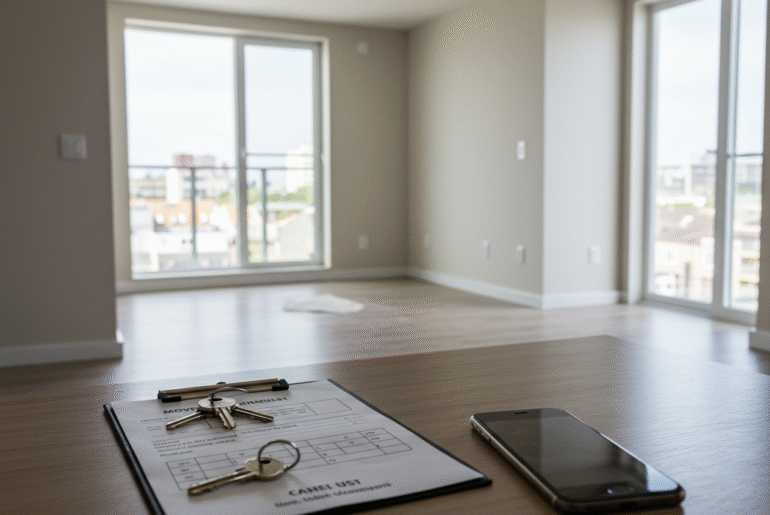This article may contain references to products or services from one or more of our advertisers or partners. We may receive compensation when you click on links to those products or services. Nonetheless, our opinions are our own.
The information presented in this article is accurate to the best of our knowledge at the time of publication. However, information is subject to change, and no guarantees are made about the continued accuracy or completeness of this content after its publication date.
- What You Should Know About Security Deposits
- Introduction
- Security Deposits and Tenant Rights
- What Is a Security Deposit?
- State Laws That Protect Renters
- Why Landlords Keep Security Deposits
- Property Damage vs. Wear and Tear
- Fees and Other Deductions
- How to Prepare for a Full Deposit Refund
- Steps to Get Your Security Deposit Back
- Final Thoughts
- Recommended Reads
What You Should Know About Security Deposits
A security deposit is money that tenants pay to landlords to protect against unpaid rent or damage beyond normal wear and tear. State laws regulate how much landlords can request and when they must return the deposit after a lease ends. Common reasons landlords keep deposits include property damage, unpaid rent, or inadequate cleaning. Tenants can improve their chances of getting the full deposit back by documenting the rental condition, thoroughly cleaning, and participating in the move-out inspection. If issues arise, tenants can resolve them by sending a formal letter, using a legal mediator, or filing a small claims case.
Introduction
Getting your security deposit back matters when you’re moving out of a rental. This deposit protects the landlord if something goes wrong during your tenancy. Both your lease and state laws define how it should be handled. To get your deposit back without issues, follow the terms in your lease, fix any damages, and participate in the inspection process. This guide explains how deposits work, outlines your rights, and provides steps to help you secure a full refund.
Security Deposits and Tenant Rights
Security deposits are standard in rental agreements across the U.S. and are governed by state-specific regulations. These deposits cover unpaid rent or damage beyond normal wear. If the tenant meets all lease obligations, the landlord must return the deposit. Each state sets its own rules, including limits on deposit amounts, required timelines for returning them, and whether they must accrue interest. For example:
- California: Landlords must return the deposit within 21 days.
- Maryland: Security deposits are capped at one month’s rent.
Understanding your state’s laws ensures your rights are protected as a tenant.
What Is a Security Deposit?
A security deposit is a payment usually equal to one or two months’ rent made before moving in. It is held in a designated account or escrow, as required by local law. If the tenant causes damage or fails to pay rent, the landlord may deduct related costs. Any remaining amount must be returned within the legally defined period.
Voted "Best Overall Budgeting App" by Forbes and WSJ
Monarch Money helps you budget, track spending, set goals, and plan your financial future—all in one app.
Get 50% OFF your first year with code MONARCHVIP
State Laws That Protect Renters
State laws dictate how landlords handle deposits. These protections typically include:
- Return Deadlines: e.g., 21 days in California.
- Deposit Limits: e.g., no more than one month’s rent in Maryland.
- Interest Requirements: In some states, deposits must be placed in interest-bearing accounts.
Knowing these rules helps ensure landlords comply with the law and return deposits fairly.
Why Landlords Keep Security Deposits
Common reasons landlords make deductions from security deposits include:
- Property Damage: Beyond normal wear, such as broken windows or holes in walls.
- Unpaid Rent: Missing rent payments or outstanding utility bills.
- Insufficient Cleaning: Excessive mess requiring professional cleaning or pest removal.
Property Damage vs. Wear and Tear
Understanding the difference between normal wear and property damage is crucial:
- Normal Wear and Tear: Faded paint, worn carpet, and minor scuffs.
- Property Damage: Broken appliances, deep stains, or holes in walls.
Documenting the property condition during move-in and move-out helps prevent disputes.
Fees and Other Deductions
Landlords may legally deduct the following:
- Outstanding rent
- Unpaid utility bills
- Cleaning fees due to excessive mess
- Repair costs for tenant-caused damage
Timely rent payments and regular upkeep can help avoid unnecessary deductions.
How to Prepare for a Full Deposit Refund
To increase your chances of receiving a full refund, take these steps:
- Provide proper notice according to your lease.
- Keep records of payments and communications.
- Thoroughly clean the property, or hire a professional service.
- Attend the move-out inspection.
- Return all keys and provide your new mailing address.
What to Collect Before Moving Out
| Item | Purpose |
|---|---|
| Lease Agreement | Understand terms related to deposit and move-out expectations |
| Payment Receipts | Show proof of rent and deposit payments |
| Cleaning Supplies or Service | Ensure the unit is clean to avoid deductions |
| Move-In Checklist or Photos | Document the condition to dispute unfair charges |
Steps to Get Your Security Deposit Back
- Review Lease and State Law: Understand your lease terms and local legal requirements.
- Document the Unit: Take dated photos or videos of the property’s condition and save repair records.
- Clean and Make Repairs: Deep clean and fix minor damage like nail holes or loose handles.
- Attend the Inspection: Join the final walkthrough and discuss any issues with the landlord on the spot.
- Return Keys and Provide Your Address: Hand in all keys and leave your forwarding address for deposit return.
Final Thoughts
Securing your deposit starts before move-out day. Know your rights, clean thoroughly, and follow your lease terms. Maintain clear communication with your landlord and document everything.
Can I use my deposit to pay the last month’s rent?
In most cases, no. Unless your lease specifically allows it, landlords expect the last month’s rent to be paid separately. The deposit is meant to cover potential damages or unpaid charges after you move out.
What happens if there is a disagreement about damages?
If you and your landlord disagree on damage deductions, gather your move-in and move-out documentation. Try resolving it directly. If that fails, you can seek help through a local housing authority, mediation service, or small claims court.
Do I have to be present during the final inspection?
While not legally required in all states, it’s a good idea to attend the inspection. Being present allows you to address concerns immediately and provide your perspective on any damage claims.
Does the landlord have to give me a written list of deductions?
Yes, in many states, landlords must provide an itemized statement showing each deduction from your security deposit. This helps ensure transparency and allows you to dispute any unjustified charges.
Can a landlord charge for repainting the walls?
Landlords generally can’t charge for routine repainting due to normal wear. Charges may apply only if there is excessive damage like graffiti, stains, or unauthorized paint colors that require extensive repair.

Reviewed and edited by Albert Fang.
See a typo or want to suggest an edit/revision to the content? Use the contact us form to provide feedback.
At FangWallet, we value editorial integrity and open collaboration in curating quality content for readers to enjoy. Much appreciated for the assist.
Did you like our article and find it insightful? We encourage sharing the article link with family and friends to benefit as well - better yet, sharing on social media. Thank you for the support! 🍉
Article Title: How to Get Your Security Deposit Back After Moving Out
https://fangwallet.com/2025/07/12/how-to-get-your-security-deposit-back-after-moving-out/The FangWallet Promise
FangWallet is an editorially independent resource - founded on breaking down challenging financial concepts for anyone to understand since 2014. While we adhere to editorial integrity, note that this post may contain references to products from our partners.
The FangWallet promise is always to have your best interest in mind and be transparent and honest about the financial picture.
Become an Insider

Subscribe to get a free daily budget planner printable to help get your money on track!
Make passive money the right way. No spam.
Editorial Disclaimer: The editorial content on this page is not provided by any of the companies mentioned. The opinions expressed here are the author's alone.
The content of this website is for informational purposes only and does not represent investment advice, or an offer or solicitation to buy or sell any security, investment, or product. Investors are encouraged to do their own due diligence, and, if necessary, consult professional advising before making any investment decisions. Investing involves a high degree of risk, and financial losses may occur including the potential loss of principal.
Source Citation References:
+ Inspo
There are no additional citations or references to note for this article at this time.












































